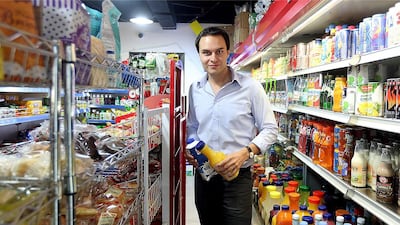The thought of navigating through a crowded supermarket after a long day just to grab a couple of ingredients for that night’s dinner is often enough to convince anyone to instead order takeout. But now, just like with cooked food delivery, ordering groceries through your mobile device has arrived in the UAE.
The idea came to “techie” Mickael Costache, 26, of Romania, who previously worked for a luxury-brand e-commerce site.
The idea emerged from a combination of his own anguish with ordering goods online while also noticing how the US company, Instacart, began making headway. The American platform recently received a US$220 million investment from a venture capital firm which shot its value up to $2 billion, according to Bloomberg.
Just last month Whole Foods, a major supermarket outlet specialising in organic produce, finalised a deal with Instacart for delivery services.
While the concept began in the US, e-commerce is growing at a fast rate globally, with online grocery set to be one of the biggest winners this year, according to Morgan Stanley. More than a third of online shoppers expect to buy groceries over the internet, and that number will only increase as a result of a new generation of Millennial shoppers.
In fact, online grocery shoppers are expected to increase to 34 per cent this year from last year’s 21 per cent.
So why couldn’t the same type of system work in the UAE? In fact, it should work even better as the UAE already has the required delivery infrastructure in place, says Mr Costache.
In September, he partnered with American Raed Hafez, 45, managing partner of Nuummite Ventures, an incubator that helps early stage investments for new companies and provides office space. The team, which has doubled in size to six people in Dubai and a development team in Europe, raised money through seed funding to launch its beta version in mid-November.
With El Grocer officially launched in January, groceries began reaching app users in Dubai in less than one hour. There is no delivery fee, but the company receives commission from retailers.
Mr Costache said that farther down the road there will be other revenue streams that will be larger. “Brands have started approaching us as they see value in targeting our audience, including [adding] analytics. And that has tremendous value,” he says.
For example, a food brand may want to know what people living or working in the Dubai International Financial Centre area order. “You can check if they order Coca-Cola or Pepsi, chips or even the basket value,” he says. “Grocery is a very dark area for them, so we can bring them more data through analytics.”
Currently, El Grocer is working with 30 stores spanning 45 communities in Dubai. By next month, the app expects to have penetration throughout the entire city. “Covering the rest of the country will be easier as we’re working with a chain,” Mr Costache says, declining to name the supermarket brand.
But El Grocer isn’t stopping there, as the team is gearing up to enter its next round of funding, which will be less than $1m, to help jump start the app’s regional expansion. “By the end of this year, we will have expanded throughout the UAE and then move to the next area which will be the GCC,” he says, adding that capital cities will be the main targets.
For many people, there is a certain pleasure in going to the grocery store and browsing the aisles. Then there are times that you want to make a dish, only to remember that you don’t have the key ingredient. And that’s where El Grocer comes into play. “We don’t expect to be the main platform, we expect to be the top off,” he says.
The founder said that this month the app is forecast to reach 4,000 downloads, and by the end of the year El Grocer expects to increase this to 50,000 users.
Since the company launched, repeat customers have increased their basket size, which currently averages around Dh60. Mr Costache said that about 30 per cent are active – or use the app at least once every three weeks – and the “vast majority” are increasing their total purchases.
The founder said that based on mobile commerce trends, the company expects a return on investment over the next five to seven years. “Obviously things can move fast and there’s a lot that can happen in five years in the technology sector. But we needed to build a model that would eventually meet profitability,” he says.
El Grocer is, however only available for iOS users as they are “usually early adopters”. Mr Costache says that there was only enough money for one platform, but in terms of volume, there are more Android users. “But we needed to choose our battles,” he says.
Other features that will be added will be working with brands that target users in a non-invasive way, according to Mr Costache. “We feel that you’d love to see some offers so we need to build features within the app, but we don’t want your experience to be cluttered.”
Before El Grocer, in the UAE it was easier to order a laptop online than a bottle of milk. Mr Costache feels that food and grocery delivery are the two sectors that hold a huge market potential, leading to daily deliveries.
“We’ll never reach 100 per cent perfect service, we want to reach a level of quality that is far superior to the current process.”
lgraves@thenational.ae
Follow The National's Business section on Twitter

